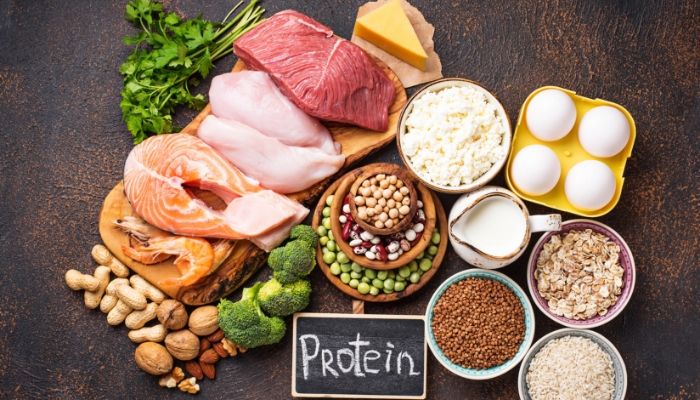Part 3 of the MACRO-trio Plan: Healthy Fats & Proteins
FEBRUARY 22, 2017 by OLIVIA NEELY, RDN, LD
In the last post I discussed everything carbohydrate. Now, we’re onto the next….
MACRONUTRIENT #2: Protein
Proteins are made out of amino acids, which are simple organic compounds that combine to form hormones, enzymes and neurotransmitters (brain chemicals). They’re essential to life and aid in metabolism, strength, repair and rebuilding inside the body. Your tissues, cells, enzymes and brain all get their nourishment and protection from amino acids.
Choosing protein-rich foods is critical in the MACRO-trio balance because proteins digest a little differently than carbohydrates. Remember how all carbohydrates break down into sugar? Well, proteins contribute to blood sugar as well, but not nearly as much as carbohydrates. This means they don’t raise blood sugar as much as carbohydrates, but are still beat out by our last macronutrient (FAT – more on that in a little bit)!
Protein is important at every meal, not only to balance out the MACRO-trio picture, but also because our bodies can only absorb so much protein at one time—so it’s essential to get it throughout the day. It’s also a quick way to calm sugar cravings because it takes longer to digest, which keeps hormones balanced. Just as with carbohydrates, we all require protein in different amounts, but we can start with a simple estimation.
Eat a portion of protein at each meal and ½ at snacks. A portion is equivalent to 20gm, or about the thickness and circumference of the palm of your hand. This usually amounts to 4-6 oz. of animal protein or 3 eggs.
RECOMMENDED SOURCES OF PROTEIN: think clean animal protein like meat, fish and seafood. Pastured eggs, wild-caught fish, cold-water fish that are low in mercury (cod, salmon, tilapia, mackerel, sardines) beef, pork, turkey, pastured chicken.
Even though I do recommend clean animal sources of protein as the main source of protein, plant sources of protein like quinoa, hemp, spirulina, and sprouts are great sources as well.
NOT RECOMMENDED SOURCES OF PROTEIN: processed meats with nitrates or MSG, meat imitation products, processed veggie burgers, soy protein, beans (if you remember these are actually a starchy source of carbohydrates).
And last but surely not least, my favorite macronutrient of all…..
MACRONUTRIENT #3: Fat
We need healthy fat, and it is critical to understand that fat doesn’t make us fat when we are eating the right kind. It’s junky carbohydrates that convert to sugar and then are stored as fat when we’ve had too much — not healthy fats — that add to our waistlines. Fat is needed for nervous system regulation, hormone production and provides the integrity of every cell membrane in the body. As part of a MACRO-trio meal, fats slows down nutrient absorption by slowing assimilation of sugar from carbs into the bloodstream and supports metabolism by triggering chemical releases in the small intestine to signal the brain you’re full!
Ever try to be on a low-fat diet? Chances are it didn’t provide sustainable weight loss, and even worse, your mood, energy, skin and even sex drive all suffered! Healthy fats not only help provide sustainable weight loss, they can lower triglyceride levels, increase the beneficial HDL cholesterol and decrease inflammation in the body.
If you haven’t started to embrace healthy fats in your diet, I encourage you to start. Begin increasing the following recommended sources into every meal slowly and feel your energy, mood and brain function completely reform.
RECOMMENDED SOURCES OF FATS: avocado, grass-fed butter (I love Kerrygold), coconut oil (my favorite is Tropical Traditions or Nutiva), nuts, seeds, cheese, olives, coconut milk (the canned kind – like Native Forest), organic heavy cream, coconut cream, olive oil, virgin red palm oil (not red palm kernel oil) and fat from organic, grass-fed meat.
Start with one serving at each meal – which is about ¼ avocado, an ounce of grass-fed cheese, 1 tablespoon grass-fed butter, coconut oil, or olive oil, 4 ounces cold-water fish or grass-fed beef, 5-10 nuts, 1 tablespoons nut butter, 5-10 olives, 1/4 cup coconut milk, 2 tablespoons of heavy cream or cream cheese, etc.
NOT RECOMMENDED SOURCES OF FAT: Man-made/damaged fats (fries, re-used, “bulk buy”) which are likely GMO, refined oils which are heated to extract oil from the seed, which damages the fat and forms free radicals that mutate in the body, where they oxidize and cause inflammation (i.e., canola oil, corn oil, soybean oil, safflower oil, sesame seed oil, cottonseed oil and vegetable oil). Shortening, margarine, miracle whip, Cool Whip and storebought baked goods. Also, any oil that has been hydrogenated or partially hydrogenated is a trans-fat and should be avoided at any cost (pumping hydrogen ions into polyunsaturated fats to makes them shelf stable). Even non-hydrogenated vegetable oils (all vegetable oils are refined) also contain some trans fats due to the extremely high heat, solvents, and pressure they’re exposed to during the refining process. And yes, this includes so-called “expeller pressed” vegetable oils as well.
These sources of fats do the exact opposite of what we want by increasing oxidative LDL cholesterol, decreasing protective HDL cholesterol, cause inflammation and disrupt the important ratio of omegs-3 to omega-6.
By now, your plate at each meal should consist of LOADS of plant-based sources of carbohydrates, a palm-sized portion of clean animal proteins and a few servings of healthy fats. Remember, keep it simple – eat all three macros at each meal and use your body’s natural feedback mechanism to tweak your specific macronutrient breakdown.
Just to show how simple this MACRO-trio pairings can be, let me share with you an on-the-go snack I have with me today to eat before I go to the gym after work…

… Can anyone tell me what the MACROs are in here??
Stay tuned for MACRO-trio meal plans coming your way!!
Want to learn more about your individual macronutrient and dietary needs? Reach out to us for a consultation today! Just call 215-558-2731 or fill out our contact form.





